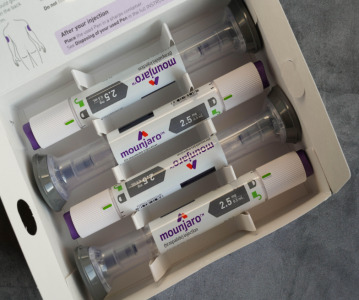FDA Accepts SNDA for Priority Review of Rapamune (sirolimus) for Treatment of Lymphangioleiomyomatosis (LAM)

Pfizer has announced that the FDA has accepted for priority review a supplemental New Drug Application (sNDA) for Rapamune (sirolimus) for the treatment of lymphangioleiomyomatosis (LAM), a rare, progressive lung disease in women of childbearing age that is often fatal. With the Priority Review designation for the sNDA, Pfizer anticipates a decision in June of 2015 based on the anticipated Prescription Drug User Fee Act (PDUFA) action date.
“If approved, Rapamune would be the first FDA-approved treatment option for patients living with LAM,” said Steve Romano, SVP and head of Global Medicines Development at Pfizer’s Global Innovative Pharmaceuticals Business. “We look forward to continuing to work closely with the FDA throughout the review process.”
The sNDA is based on results from the Multicenter International Lymphangioleiomyomatosis Efficacy and Safety of Sirolimus (MILES) Trial. The MILES Trial included 89 LAM patients with moderate lung impairment who were randomized to receive Rapamune (dose adjusted to 5-15 ng/mL) or placebo for 12 months, followed by a 12 month observation period. In the trial, those treated with Rapamune for one year experienced stabilization of lung function as measured by forced expiratory volume in one second (FEV1). Full results of the MILES Trial were published in the New England Journal of Medicine. The most common adverse events reported during the study were mucositis, diarrhea, nausea, hypercholesterolemia, acneiform rash and swelling in the lower extremities. The adverse drug reactions observed were consistent with the known safety profile of Rapamune in renal transplant patients, with the exception of weight decreased, which was reported at a greater incidence with Rapamune compared to placebo.
“The results of the MILES Trial demonstrated that Rapamune has the potential to stabilize lung decline in patients suffering from LAM,” said Dr Francis X. McCormack, Director of Pulmonary, Critical Care and Sleep Medicine at the University Of Cincinnati School of Medicine and the lead investigator of the MILES Trial. “We are excited about the FDA’s review of Rapamune and the potential to make this medication available to LAM patients.”
The MILES trial was conducted by Dr McCormack and conducted within the NIH Rare Lung Diseases Consortium. Pfizer provided study drug and a portion of the funding, but had no involvement in the design or conduct of the study. The LAM Foundation assisted with the recruitment of patients and logistics for the study.
“For 20 years, the LAM Foundation has been committed to seeking treatment options for LAM and we are thrilled about the possibility of getting a therapy approved to treat this rare and potentially deadly disease,” said Susan E. Sherman, Executive Director of the LAM Foundation.
Related News
-
News The next 15 drugs up for negotiation with Medicare include several blockbusters
By now, everyone is quite familiar with the drug price negotiations taking place between drug companies and the Centres for Medicare & Medicaid Services (CMS) in the USA as part of measures being taken to reduce the cost of drugs for patients, to make ... -
News PSCI Welcomes Delpharm, Samsung Biologics, and Suven as First Supplier Partners
The pharmaceutical industry continues to evolve with an increasing focus on responsible sourcing, sustainability, and collaboration across the supply chain. Under a new model to recognise suppliers within the pharmaceutical and healthcare industry that... -
News Drug prices agreed upon as part of the US Inflation Reduction Act
The Inflation Reduction Act brought into constitution by the Biden administation in 2022, which proposed a drug price negotiation between the government and pharmaceutical companies, has reached it's first agreement. -
News Eisai Alzheimer’s drug authorised in UK but still faces obstacles
In partnership with BioArctic AB, pharmaceutical company Eisai has been granted Marketing Authorisation by the Medicines and Healthcare products Regulatory Agency (MHRA) for its Alzheimer’s disease drug product Leqembi. -
News Eli Lilly's weight loss drugs removed from the FDA's shortage list
The US FDA have recently updated their drug shortage list. The recently released list shows that all dosage forms of Eli Lilly's weight-loss drug Zepbound and their diabetes drug Mounjaro are now available. -
News Global advancements in the diagnosis and treatment of rare diseases: Rare Disease Day 2024
Rare Diseases Day is celebrated on the 29th February 2024 and represents the plight of rare disease patients to gain diagnosis and access to suitable treatment. -
News Pharmaceutical industry supports COP28 health stance in joint statement
As COP28 takes place over this week in Dubai, UAE, several bodies in the pharmaceutical and health industries have come together to announce support of key movements in sustainability in the sector, and to recognise sustainability as a health issue.&nb... -
News Biden backs Cold-War measures to shore-up medical supply chains
In a recent strategy to combat rising inflation and the cost of living crisis, President Joe Biden has invoked a Cold War-era act to increase investment in a selection of medicines and supplies.
Recently Visited
Position your company at the heart of the global Pharma industry with a CPHI Online membership
-
Your products and solutions visible to thousands of visitors within the largest Pharma marketplace
-
Generate high-quality, engaged leads for your business, all year round
-
Promote your business as the industry’s thought-leader by hosting your reports, brochures and videos within your profile
-
Your company’s profile boosted at all participating CPHI events
-
An easy-to-use platform with a detailed dashboard showing your leads and performance



.png)



